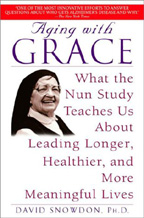 Aging with Grace
Aging with Grace
Dr. David Snowden
Bantam Doubleday Dell Pub (Trd Pap)
256 pages (April 30, 2002)
ISBN: 0553380923
“Do you know what my worst fear was? That I was going to forget Jesus. I finally realized that I may not remember Him, but He will remember me. “
– Sister Laura, a participant in the “Nun Study”
When many of us think of old age, we think of an inevitable decline into illness, disability and diminished mental acuity, but Dr. David Snowden’s book “Aging with Grace: What the Nun Study Teaches us About Leading Longer, Healthier and More Meaningful Lives” shows us that it doesn’t have to be. In fact, old age can be a time of hope, creativity and spiritual grace.
The book describes a long-term research study that followed a unique population of almost 700 Catholic sisters and how they aged. It is a unique and groundbreaking study, in that it was able to trace a population that had lived carefully regulated and well-documented lives over an extended period of time. Some of the records were traced back to the early 1900’s and many of the sisters lived into their nineties and beyond. Dr. Snowden and his research team asked a very simple question: why do some sisters continue to teach and serve, and retain strong mental acuity well into their eighties, nineties and even past one hundred, while others, with similar lifestyles, decline into illness and mental disability?
What he finds is both astonishing and challenging. Yes, aging may be inevitable, but Alzheimer’s disease, and mental decline is not. Want to avoid Alzheimer’s disease and stroke in old age? It helps if you have won the genetic roll of the dice and avoided “the Alzheimer’s gene” (APOE-4, which has been shown to spur the formation of damaging “plagues” in the brain). It also helps if you have enough folic acid and lycopen (a red pigment found in tomatoes, watermelon and pink grapefruit) in your diet. But what is the strongest predictor of a long, mentally healthy life? Positive emotional attitude in early life, and an ability to express complex ideas (idea density).
This was, to me, one of the most extraordinary findings of the “Nun Study”. The research team hired a linguistic expert to analysis autobiographical writing samples written by the sisters when they entered the convent as young women. They found that the women who expressed ideas with a poetic, lyrical flare, that were high in idea-density and positive emotional expression, lived longer (by an average of 6.9 years) than the “listers”, those whose biographers read like a grocery list. With an astounding 85-90 percent accuracy, they could predict who would get Alzheimer’s disease approximately sixty years later based on a linguistic analysis of their autobiography.
Dr. Snowden’s background in research and epidemiology steps in at this point as he begins to reflect on his data. Do the positive emotions and poetic expression act as a sort of buffer to protect us from the effects of sorrows and tragedies? Given that the sisters in his study live about 25 percent longer than the general population of women in the United States, is it due to their community lives, their live of prayer and spirituality, or some other un-determined factor?
But, above all, this book really shines as a series of stories about aging. Interwoven between scientific descriptions of his research approach, data collected and conclusions reached, we get a glimpse into the lives of some remarkable women. He describes his friendships with the sisters, his growing admiration for their lives of prayer and service. One of his research subjects had knitted 1500 pairs of mittens! Another had earned her master’s degree in theology at age 71, and at age 92 told him “I’m too busy to be in a study about old people”.
He also describes with a certain sadness sisters who begin to lose their mental and physical abilities, suffer depression and illnesses. Alzheimer’s disease, stroke and illnesses are harsh realities, and Dr. Snowden knows he doesn’t have all the answers. He knows that for every conclusion, there is exception, and is quick to point out the many-layered complexities behind his findings. He is ultimately a scientist, but he is a scientist with a heart, a man who hopes that his research will help people to live long lives, and retain their mental faculties to the end. As he himself concludes, the rock band “The Who” had it all wrong: we shouldn’t hope to die before we get old, but rather to get old before we die. Because, given good health, old age can be a time of incredible joy, creativity and freedom.

 Meaning Conference 2025 will be the INPM’s first in-person conference with a virtual option after the pandemic.
Meaning Conference 2025 will be the INPM’s first in-person conference with a virtual option after the pandemic.